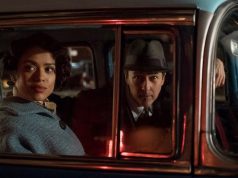I know just enough about the life of “Peter Pan” author J.M. Barrie to know that “Finding Neverland” has taken some liberties with the facts. But I know enough about movies to know that I don’t care. The film’s loveliness has nothing to do with whether its events are true.
It was directed by Marc Forster, whose last work, “Monster’s Ball,” wouldn’t have made me suspect he was capable of such sweet, imaginative fare as this. The film is set in strictest reality, but it has magic glittering in the corners — which, as it happens, is exactly the way J.M. Barrie lived his life.
Barrie is played with astonishing perfection by Johnny Depp, who at this rate is going to become the best actor of his generation whether he wants the attention or not. Depp has long excelled at playing characters who are odd, outcast or strange, always giving them humanity, too, but I don’t think I’ve ever seen him combine quirkiness and soulfulness as well as he does here. J.M. Barrie comes across as unusual, for sure, but with emotions and passions that are universal.
The time is 1903, when Barrie’s latest play, “Little Mary,” has flopped on London’s West End. He has been spectacularly successful in the past, and his bank account proves it, but he is now in a creative slump. He spends most days sitting on a park bench with his large sheep dog, doodling, jotting and thinking, off in his own world.
It is at the park that he meets Sylvia Llewelyn Davies (Kate Winslet), a young widow with four boys. They are immediately smitten with Barrie’s stories and extremely active imagination; Barrie, for his part, seems to relate better to children than to adults.
The only boy not impressed with Barrie is young Peter (Freddie Highmore). He has taken the death of his father harder than anyone else, it seems, and he remains sullen, a child trying to act like a grownup. He and Barrie are opposites. Barrie is inspired to write a play expressing his own fondest dream: It’s about a boy who gets to stay young forever.
Barrie’s personal life is a shambles, it need hardly be said. He spends all his time with the Davies family — not courting Sylvia, and certainly not behaving inappropriately with the children (he seems far too innocent, perhaps even asexual, to even consider such a thing), but simply playing and imagining. His wife Mary (Radha Mitchell) wants the social status that usually comes with money, but her husband is bored with snooty parties and finds adults in general to be dull. Mary doesn’t understand Mr. Barrie’s attachment to the Davieses, and neither does Sylvia’s mother (Julie Christie), whose actions at the end of the film give it its unfortunate too-easy resolution.
Barrie may have been born at exactly the right time. Edward VII was the king in 1907, but it was still the “Victorian Era” as far as society was concerned: stuffy, repressed and puritanical. Children were scarcely permitted to have fun at all, and so here comes J.M. Barrie — an adult with money and influence — to set them free and show them how childhood is supposed to be.
The film, adapted by David Magee from Allan Knee’s play, captures this attitude wonderfully. Several whimsical scene depict Barrie and the boys’ improvised adventure stories, included as if to prove the point that when you’re a child, few things have the power to uplift and heal like good old-fashioned fun. It’s pretty effective for adults, too.
A- (1 hr., 42 min.; )





